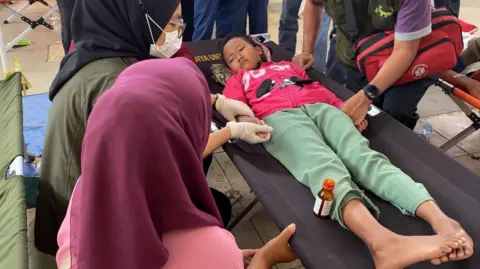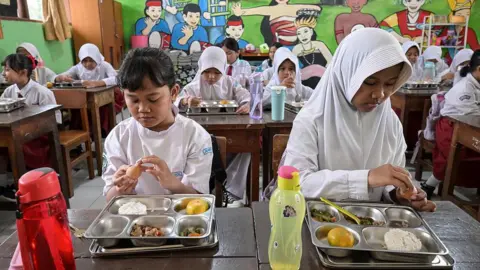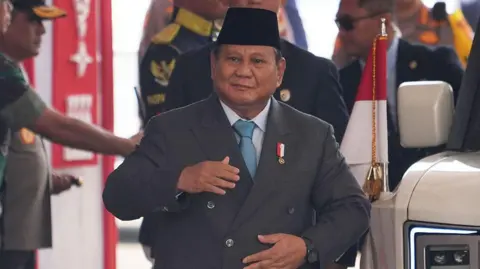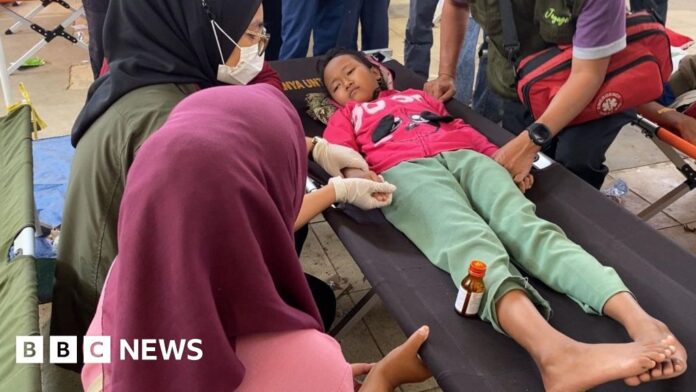Gavin Butler,
Muhamad IrhamBBC Indonesia, Jakarta and
Yuli SaputraBBC Indonesia, West Java
 Yuli Saputra
Yuli SaputraMore than 1,000 children have fallen ill from free school lunches in Indonesia this week, according to authorities – the latest in a string of mass food poisoning events linked to President Prabowo Subianto’s multi-billion-dollar nutritious meals programme.
Yuyun Sarihotima, head of West Java’s Cipongkor Community Health Center, told BBC Indonesia that the total number of poisoning victims recorded between Monday and Wednesday had reached 1,074.
It follows the poisoning of 800 students last week in West Java and Central Sulawesi provinces.
President Prabowo has made the nutritious meals programme – which aims to offer free lunches to 80 million school children – a signature of his leadership.
But a spate of mass food poisoning incidents has led non-governmental organisations to call for authorities to suspend the programme due to health concerns.
Muhaimin Iskandar, Coordinating Minister for Community Empowerment, said on Wednesday that “there are no plans to stop it”.
Victims of the recent outbreaks complained of stomach aches, dizziness, and nausea – as well as shortness of breath, which is a non-typical symptom of food poisoning.
In previous cases of food poisoning stemming from the free lunch programme negligent food preparation has been cited as a suspected cause.
This week’s victims ate meals that included soy sauce chicken, fried tofu, vegetables and fruit – but past poisoning incidents have been linked to expired sauce and, in one case, the serving of fried shark.
The head of Indonesia’s National Nutrition Agency (BGN) Dadan Hindayana said on Wednesday that the mass food poisoning in Cipongkor last week was the result of a technical error by the Nutrition Fulfillment Service Unit (SPPG).
The SPPG’s operations in Cipongkor have reportedly been suspended, according to the BGN.
West Bandung regent Jeje Ritchie Ismail said his party had declared the mass poisoning in Cipongkor “an extraordinary event so that handling can be faster and more comprehensive”.
 Getty Images
Getty ImagesCipongkor is where the first suspected case of this week’s mass poisoning occurred on Monday – with the number of victims quickly increasing to some 475 students.
On Wednesday, another mass poisoning in Cipongkor saw as many as 500 students fall ill after consuming free lunches.
The BGN reported that from January to 22 September, there were 4,711 cases of free school lunch poisoning. The majority of cases occurred on the island of Java.
However, a higher figure was reported by the Indonesian Education Monitoring Network (JPPI). This NGO recorded that as of 21 September, the number of poisoning victims had increased to 6,452 children.
“This abnormal situation should require the government to declare an outbreak and temporarily halt the programme for a thorough evaluation,” said JPPI National Coordinator Ubaid Matraji.
Some have called for changes to the scheme, including a proposal that funds be distributed directly to parents so that they can prepare meals for their children instead. The BGN has previously rejected this idea.
 Getty Images
Getty ImagesAcross the world, programmes offering free meals to students have proved to be effective in improving health, academic performance and attendance.
But Indonesia’s $28bn (£21bn) version – shaping up to be the most expensive of its kind – has become the growing target of food safety concerns and heated anti-government protests.
A centrepiece of Prabowo’s presidential campaign last year, the free meals programme was pitched as a way to tackle stunting – a condition caused by malnutrition that affects a fifth of children below the age of five in Indonesia.
“Through this initiative, our children will grow taller and emerge as champions,” Prabowo said in 2023.
Since he took office last October, this programme, along with other populist policies like new houses and free medical check-ups, have earned him political points. His approval ratings stood at 80% after his first 100 days in power.
In the first phase, which began in January, free school meals have made their way to 550,000 students in 26 provinces.
While the programme is “well-intentioned”, Maria Monica Wihardja, a visiting fellow at ISEAS-Yusof Ishak Institute, previously told the BBC there has been “no evidence” of “widespread urgency” for free school meals.
According to a national survey in 2024, less than 1% of Indonesia’s households went at least one day without any meals in the past year.
The cost of the programme has not helped matters.
Indonesia has set aside more than $10bn this year for the free school meals.
By comparison, India spends $1.5bn a year to feed 120 million children in what is the world’s largest such programme. Brazil’s version costs about the same and serves some 40 million students.
Defenders of the programme have argued that it has been approved and secured in the already-passed 2026 State Budget.
But experts have warned that its colossal cost could also lead to other concerns.
Large-scale social assistance programmes in Indonesia have historically been “riddled with corruption”, Muhammad Rafi Bakri, a research analyst at Indonesia’s audit board, told the BBC.
“Given the sheer size of the budget,” he said, “this programme is a goldmine for corrupt officials.”
With additional reporting by Koh Ewe and Hanna Samosir



